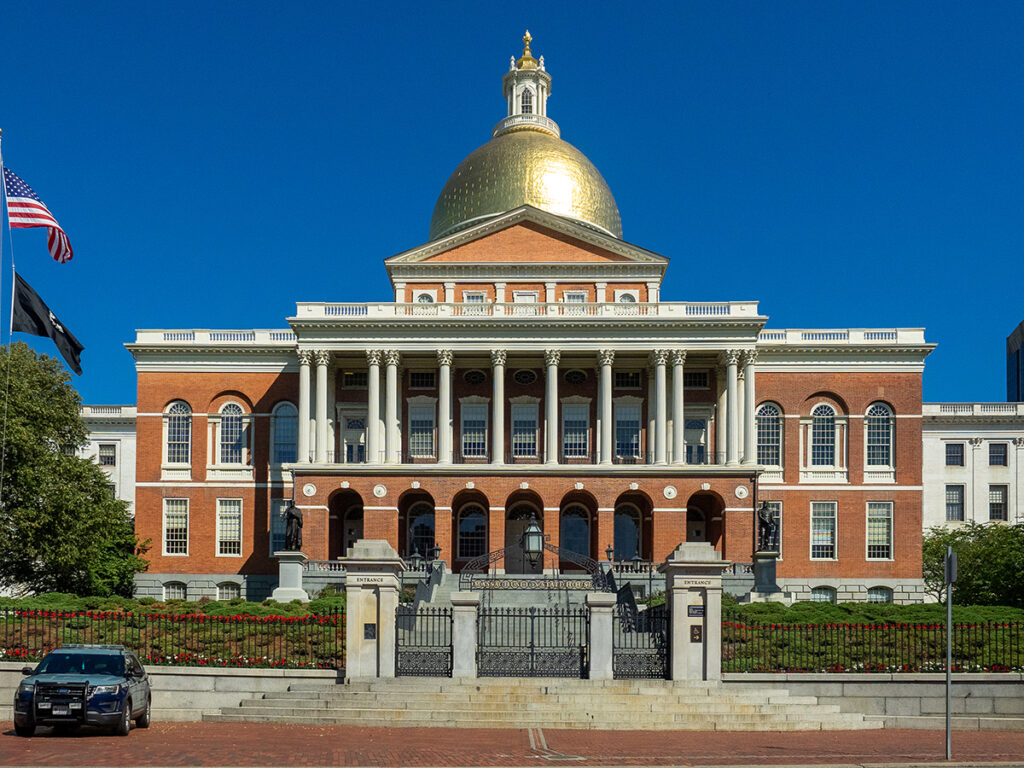Gathering News in 2020: How Journalism Classes Are Navigating Elections, COVID

By Erin Clossey
Typically, this close to Election Day, Korey O’Brien would have his students in his Road to the White House class fan out across the region, following candidates, talking to voters, covering rallies and campaign events. Normally, students might even make the trip north to the swing state of New Hampshire — particularly during this high-stakes election.
But “normally” hasn’t been an option for months now, so O’Brien, and the rest of the Journalism faculty have been asking students to try different ways of getting the story and telling it. These days, that’s essential.
“What are journalists doing right now?” asked O’Brien, an affiliated faculty member and morning executive producer for 7News Boston WHDH. “Journalists are doing Zoom calls, are reaching out through social media. I’m taking what I’m doing in the newsroom right now and translating that to the classroom. … [Students] are doing exactly what their future selves are doing.”
One of his recent assignments was to ask students to cover something using a social media platform that isn’t necessarily known for being a news source, but that is mostly like informing their peers.
Some students used TikTok, a medium better known for dance routines and pancake cereal than political journalism, but other students dug up social media sites that O’Brien hadn’t even heard of.
“I think they realize they can kind of break the norm,” O’Brien said. “They realize, ‘I flip through this app every single day. What if I’m on that app giving facts, instead of people giving misinformation?’”
Weighing the risks
Affiliated faculty member Dan Defraia used to work for the Committee to Protect Journalists (CPJ), where he was a case worker for reporters covering dangerous situations abroad. This year, he used his experience with CPJ to help design guidelines for students covering the pandemic and protests against systemic racism.
Students in his Beat Reporting class need to get Defraia’s approval before covering anything in person, whether a protest, a campaign event, or an art exhibit.
“The first question is, how do we calculate the news value vs. the risk?” Defraia said.
In a war zone on the verge of genocide, where a reporter is the only one there to cover it, an argument can be made for risking life and limb to get the story, he said. It’s harder to justify a student potentially contracting COVID-19 in order to cover a protest for a class, when every news outlet in the region is covering it as well.
Despite the restrictions, Defraia said, the students are “excelling.”
“I think the pandemic makes it harder and makes it less exciting and fun, but that just means you have to work harder,” he said. “The students care, and they’re doing well.”
Local is Critical
One of those students is Anne Bennett ’23. She’s covered the Boston City Council election, is working on her first audio story, and uncovered voter suppression in a city outside Boston.
“My goal is that come Election Day, people have an idea of who to vote for,” Bennett said of her efforts, some of which have been pitched to the Boston Globe.
Most eyes are on the presidential and Senate elections, for good reason. But Bennett said she’s more interested in local elections.
“I realize a lot of who you see in Congress and the Oval Office starts at the local level, and a lot of the policies that are affecting regular people are being overlooked by the mainstream media,” she said.
That’s why although she’s excited by the way journalism is evolving and using so many different platform and mediums, Bennett said she feels uneasy by the constant devouring and shuttering of smaller news outlets. They’re so important to democracy.
“I hope people are starting to recognize that and continue to fund it,” she said.
Making Government More Accessible
One of the very few positive developments to spring from the pandemic has been the migration of government business to Zoom and other teleconferencing platforms, said affiliated faculty member Richard Nangle. Nangle is teaching a class in Public Affairs Reporting, in which students learn about covering public agencies, as well as Congressional races and local ballot questions.
Typically, reporters and interested citizens would have had to get themselves to City Hall or the State House or the local school administration building in order to witness their elected officials in action. Now, anyone with an Internet connection can log in and watch a meeting, and they don’t need to arrange for transportation or child care.
“It’s kind of flattened democracy a little bit, and I think it’s made it a lot more accessible,” Nangle said. “It’s also made it easier to reach people, because let’s face it, everybody’s home now. … Hopefully, it’s something that’s going to stay after this pandemic is over.”
Caroline Bond ’23, a student in Nangle’s class, said that her eyes have been opened to the workings of state government, as well as all the different methods of news gathering. She said she especially appreciates learning about all the publicly available documents that can be treasure boxes of stories.
“I think that’s something that has been really cool about learning how to cover politics, especially in this COVID age, where it’s not as easy to get face-to-face with someone,” she said.
Categories